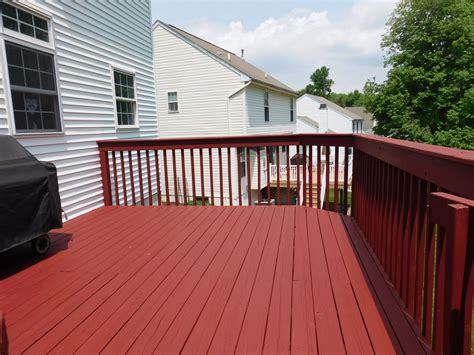When it comes to enhancing the aesthetic appeal and durability of an exterior deck, the right paint can make all the difference. Exterior deck paint is specifically designed to withstand the elements, including sunlight, rain, and extreme temperatures, ensuring that the deck remains protected and looks its best for years to come. With a wide range of colors and finishes available, homeowners can choose the perfect paint to match their deck's style and complement their home's exterior. In this article, we'll delve into the world of exterior deck paint, exploring its benefits, types, and application process, as well as providing expert tips and recommendations for achieving a professional-looking finish.
Key Points
- Exterior deck paint provides a durable and waterproof barrier against the elements
- Available in a range of colors and finishes, including oil-based and water-based options
- Proper preparation and application are crucial for a long-lasting and professional-looking finish
- Regular maintenance and touch-ups can help extend the life of the paint and prevent damage to the deck
- Consider factors such as UV resistance, mildew resistance, and slip resistance when selecting a paint
Benefits of Exterior Deck Paint

Exterior deck paint offers numerous benefits, including protection against the elements, enhancement of the deck’s appearance, and increased durability. By applying a high-quality paint, homeowners can create a waterproof barrier that prevents moisture from seeping into the wood, reducing the risk of rot, decay, and damage from insects. Additionally, paint can help to protect the deck from the harsh effects of sunlight, fading, and discoloration, ensuring that the deck remains looking its best for years to come.
Types of Exterior Deck Paint
There are several types of exterior deck paint available, each with its own unique characteristics and benefits. Oil-based paints, for example, are known for their durability and resistance to fading, while water-based paints are easier to clean up and have lower VOCs (volatile organic compounds). Some paints are also specifically designed to provide additional benefits, such as mildew resistance, slip resistance, or UV protection. When selecting a paint, it’s essential to consider factors such as the deck’s material, climate, and intended use, as well as personal preferences and budget.
| Paint Type | Characteristics | Benefits |
|---|---|---|
| Oil-based | Durable, resistant to fading | Long-lasting, protects against elements |
| Water-based | Easier to clean up, lower VOCs | Environmentally friendly, faster drying time |
| Mildew-resistant | Contains additives to prevent mildew growth | Reduces risk of mildew and mold |
| Slip-resistant | Contains additives to improve traction | Reduces risk of slips and falls |

Application Process

The application process for exterior deck paint is crucial for achieving a professional-looking finish. Before painting, the deck should be thoroughly cleaned and prepared, including sanding and filling any gaps or cracks. The paint should be applied according to the manufacturer’s instructions, using a high-quality brush or roller. It’s essential to work in small sections, applying thin coats and allowing each coat to dry before applying the next. This will help to prevent drips and unevenness, ensuring a smooth and even finish.
Tips and Recommendations
To achieve a long-lasting and professional-looking finish, it’s essential to follow some expert tips and recommendations. First, always read and follow the manufacturer’s instructions for the specific paint being used. Second, make sure to prepare the deck thoroughly, including cleaning and sanding, to ensure a strong bond between the paint and the wood. Third, apply thin coats, allowing each coat to dry before applying the next, to prevent drips and unevenness. Finally, consider applying a clear sealant or topcoat to provide additional protection and enhance the appearance of the paint.
What is the best type of exterior deck paint for a pressure-treated wood deck?
+A paint specifically designed for treated wood is recommended, as it will provide the necessary protection and durability for the deck. Look for a paint that is labeled as "treated wood compatible" or "pressure-treated wood approved."
How often should I repaint my exterior deck?
+The frequency of repainting an exterior deck depends on several factors, including the type of paint used, the deck's material, and the climate. As a general rule, decks should be repainted every 5-10 years, or as needed. Regular maintenance and touch-ups can help extend the life of the paint and prevent damage to the deck.
Can I use exterior deck paint on other outdoor surfaces, such as fences or railings?
+Yes, exterior deck paint can be used on other outdoor surfaces, such as fences or railings, as long as the surface is properly prepared and the paint is compatible with the material. However, it's essential to read and follow the manufacturer's instructions and take necessary safety precautions to ensure a successful application.
In conclusion, exterior deck paint is a vital component of any outdoor deck, providing a durable and waterproof barrier against the elements while enhancing the deck’s appearance. By selecting the right paint, preparing the deck properly, and following expert tips and recommendations, homeowners can achieve a professional-looking finish that will last for years to come. Whether you’re looking to protect your deck from the elements, enhance its appearance, or simply add a touch of color and style to your outdoor space, exterior deck paint is an excellent choice. With its numerous benefits, types, and application process, it’s no wonder that exterior deck paint has become a popular choice among homeowners and contractors alike.
